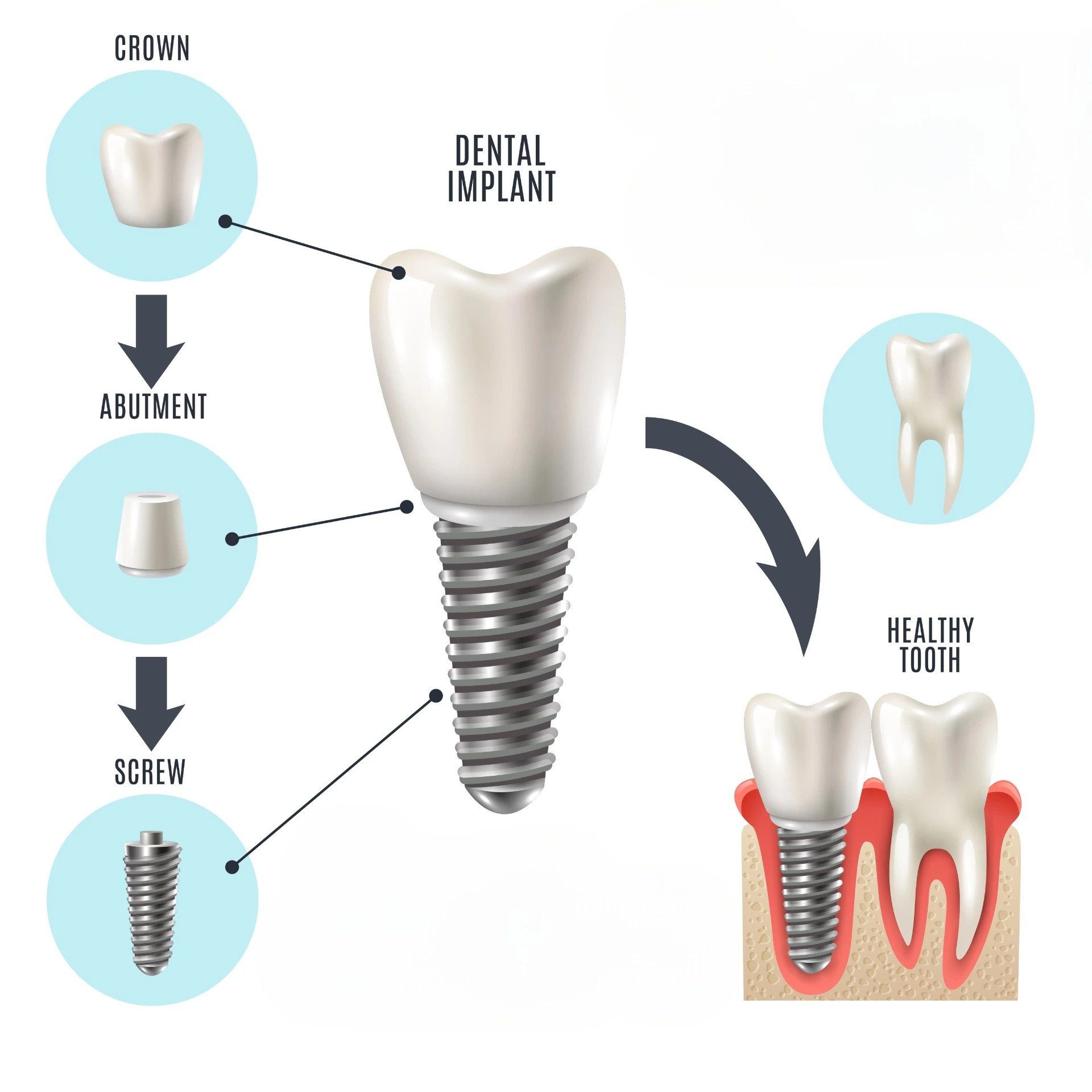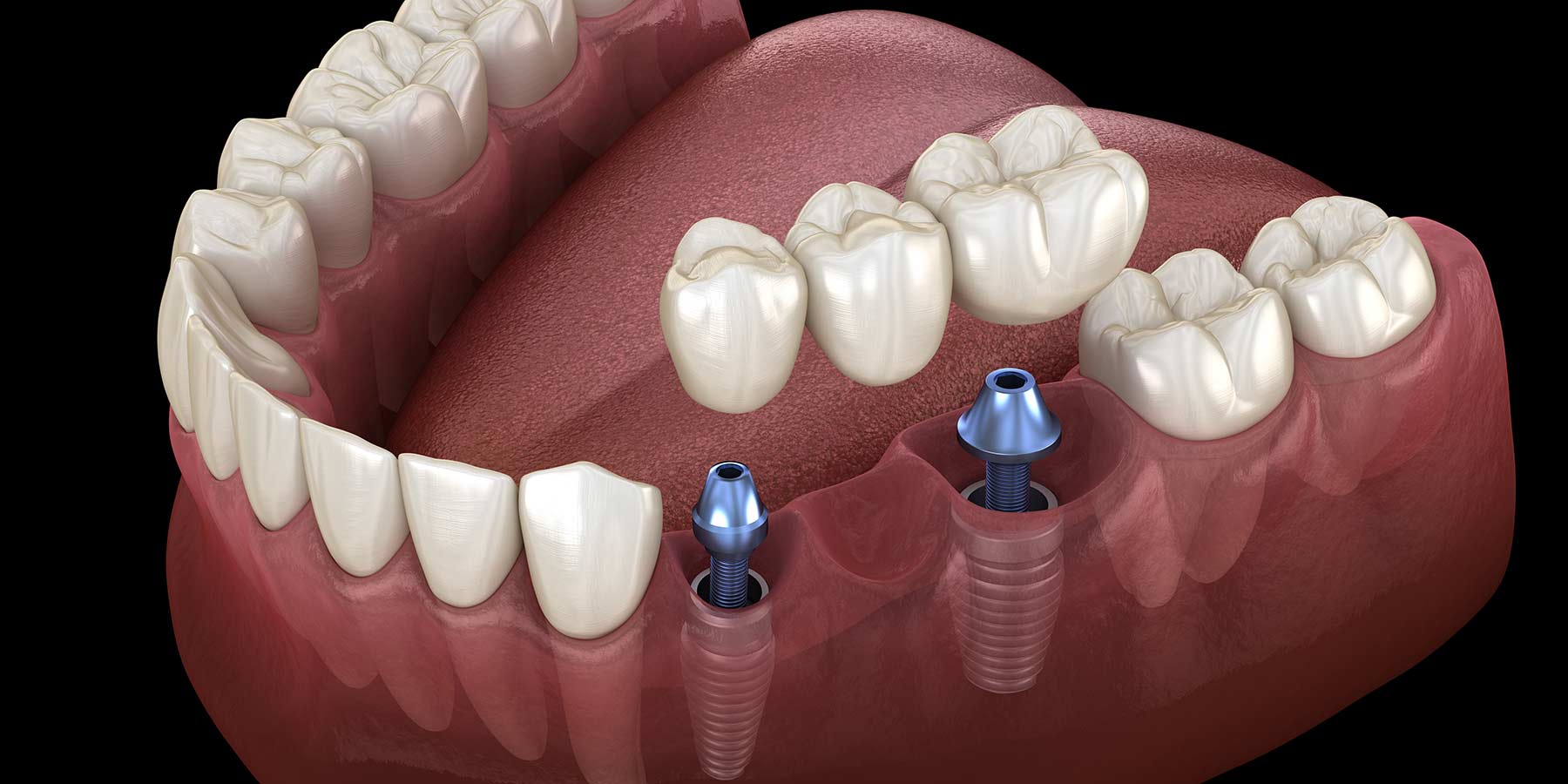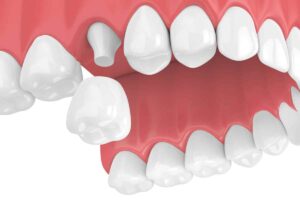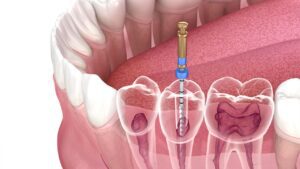Table of Contents
Despite advancements in dental treatment, millions of Americans lose teeth every year, most frequently due to tooth decay, periodontal disease, or trauma. Dentures and bridges were the only treatments available for many years for people who had lost teeth. But dental implants are now readily available.
What are dental implants?
Dental implants are replacement tooth roots. These artificial structures provide a strong foundation for replacement teeth and delay the resorption of the jaw bone. Teeth implantation is a prosthetic (artificial replacement) and cosmetic dental procedure.
People who have lost teeth may find it difficult to smile or speak. Additionally, the inconsistencies in biting caused by tooth loss can negatively affect eating habits, resulting in secondary health issues, including malnutrition.
By replacing missing tooth roots, dental implants give people the power and stability to eat all the foods they enjoy without struggling to chew. Additionally, they improve face characteristics by stimulating and maintaining the jaw bone. Typically, when someone refers to “dental implants,” they mean both the implant (the false tooth root) and the prosthetic tooth.
Dental implant systems consist of an implant body, an abutment, and, in some cases, an abutment fixation screw. The dental implant body is surgically placed in the jawbone in the place of the lost tooth root. The abutment often protrudes through the gums to support the attached prosthetic teeth. It is fixed to the implant body with an abutment fixation screw.
When are dental implants needed?
We already know that dental implants serve as replacement roots for missing teeth. Implants don’t slip, make noise or injure your bone because the titanium in the implants fuses with your jawbone.
In general, you might benefit from dental implants if you:
- Have lost one or more teeth
- Can’t or don’t want to wear dentures
- Want to speak more clearly
- Have enough bone to anchor the implants or have access to a bone graft
- Are prepared to devote a few months to the procedure
- Don’t have any health problems that could interfere with bone healing.
What are the benefits of dental implants?
Dental implants offer several benefits, including:
Better appearance
Dental implants mimic your natural teeth in appearance and feel. They also become permanent since they are made to merge with bone.
Speech improvement
The teeth of ill-fitting dentures may slide about in your mouth, causing you to stammer or murmur. You may speak with dental implants without worrying that your teeth could slip.
Enhanced comfort.
Implants alleviate the discomfort of removable dentures since they integrate into your body.
Easier to eat
Chewing may be challenging with sliding dentures. Dental implants mimic the function of your natural teeth, allowing you to confidently eat the foods you love.
A higher sense of self.
Dental implants can restore your smile and improve your self-confidence.
Better oral health.
While a tooth-supported bridge necessitates the reduction of adjacent teeth, dental implants do not. More of your natural teeth are left unaltered to support the implant, enhancing your oral health over the long run. Additionally, individual implants make it simpler to clean in between teeth.
Durability
Implants have a long lifespan and are pretty durable. With proper dental care, implants can last a lifetime.
How long do dental implants last?
The critical determinant of how long your implants will last is how well you take care of them and if you attend your scheduled maintenance appointments.
Implants can acquire a coating if you don’t take care of them. If left untreated, this can result in gum infection, bleeding, inflammation, and general discomfort.
You should expect your implants to last for many years if you take good care of them and if the bone they are matched to is solid and healthy.
The complete procedure for getting dental implants
Before getting dental implants, you should:
- Give your dentist a list of all your current medications and supplements. Your dentist and doctor will decide whether you need to change or stop taking any drugs before your implant treatment.
- To guarantee that no issues could prevent implant success, ensure you’ve recently seen your primary care provider for a checkup and blood testing.
Timeline
The dental implant procedure may take several months to complete. Your dentist and a dental surgeon, such as an oral surgeon or periodontist, are involved in the procedure. Most surgical treatments are brief (less than an hour) and use local anesthetic, which is comparable to what you would receive for regular dental work.
Tooth extraction
The dental surgeon first extracts the problematic tooth. A bone graft and membrane are frequently placed at the moment of extraction to ensure you’ll have enough bone for implant insertion. The bone graft and membrane are relatively safe as they come from a donor bank. They encourage your body to create new bone when the tooth is extracted.
Implant placement
After the area has healed for about three months, your dentist will insert the dental implant in the space where your tooth formerly stood. A few drills are used during the treatment, much like when getting a filling. An extra three months are often needed for the implant to recover.
Temporary teeth
A temporary tooth may be attached when the implant is placed or after it has healed.
Dentures or permanent teeth
Your dentist will scan or model your mouth and send the models or scan to a dental lab. A few weeks later, the permanent abutment (connection piece) and the tooth will be attached to the implant.
What to do after getting a dental implant?
Your dentist will prescribe an antibiotic to take in the first week following the placement of your implant, but you will primarily rely on over-the-counter pain relievers like ibuprofen to treat any soreness.
Following implant placement, you can anticipate minor pain. For one week following surgery, you will be restricted in what you can eat and how much exercise you can get.
Types of dental implants
Dental implants come in various forms, as do the procedures. Your dentist will suggest whichever may be ideal for you. Dental implants can replace one tooth or multiple teeth.
Single tooth implant
If you only need to replace one tooth, your dentist will perform a single-tooth implant and insert a single replacement tooth or crown.
Multiple tooth implant
If you have a few missing teeth, your dentist may perform a multiple-tooth implant with replacement teeth.
Complete-mouth implant
Your doctor might do a full-mouth dental implant if you are toothless.
Basic implant types
Implants come in two primary types:
Endosteal
These implants are inserted into the jawbone. They are the most popular implant type, often made up of titanium. Endosteal implants resemble tiny screws.
Subperiosteal
These dental implants are positioned on or above the jawbone but beneath the gum line. Patients who do not have enough healthy jawbones or do not want a bone augmentation treatment may use this type of implant.

Alternative methods for dental implants
In addition to the conventional multi-step dental implant process, your dentist may recommend various alternative treatment options, depending on the condition of your jawbone and your unique needs. Several procedures can be used to grow bone, restore your natural jawline, and create a strong foundation for implant-supported teeth if your jawbone cannot support dental implants. These consist of the following:
Bone augmentation
Bone augmentation is used to heal or renew your jawbone when it cannot support implants. According to a study, strengthening the bone with growth hormones and supplements usually yields the best results.
Sinus lift
This treatment, also known as sinus augmentation, involves inserting bone beneath the sinus. It is used in cases where the natural bone has deteriorated due to missing upper back teeth.
Ridge expansion
If the width of your jaw prohibits it from supporting dental implants, a small ridge or gap can be created at the top of your jaw and filled with bone graft material.
3D treatment planning and imaging
The success of implant treatments has been substantially accelerated by developing contemporary, highly accurate 3D digital imaging and implant surgery planning systems. These tools enable your dentist to evaluate the structure of your jaw and determine the optimum implant placement sites before surgery. This shortens the recovery period and saves time and money.
Mini dental implants (MDIs)
These toothpick-sized implants are also known as small or narrow-diameter implants since they have a smaller diameter than most dental implants currently in use. They are often implanted using less invasive techniques and are used to maintain a lower denture.
All-on-4
All-on-4 is an alternative to replace an entire teeth arch. Four dental implants are placed into the available bone to avoid the need for bone grafting. Dentists advise following a restricted diet as the gum tissues recover and the implants fuse with your natural bone. After around six months, the permanent replacement teeth will be in place, and you can resume your regular diet.
Are dental implants painful?
A local anesthetic is typically used while placing an implant. While there won’t be any pain at the time of the procedure, you might experience some discomfort a week afterward, much like after an extraction. Your dentist may sometime give you a sedative if you are anxious or the case is complicated.
What is the cost of getting dental implants?
Dental implants typically cost between $3,000 and $5,000. It covers the positioning of the post, abutment, and crown. CT scan, X-ray, bone grafting, and tooth extraction might cost you extra. Visit Quincy High Care Dentistry for high-quality dental implant procedures at an affordable price.
Why should you choose Quincy High Care Dentistry to get dental implants?
Quincy High Care Dentistry should be your go-to choice for dental implants. Dr. Shaban provides the Quincy, MA area with the highest standard of personalized dental care in a friendly and professional manner. With over 25 years of experience and hundreds of satisfied patients, the dedicated team is passionate about providing expert dental care to everyone. Our dentist’s office is equipped with the latest technology and tools to ensure that your implants are placed correctly and securely. Book an appointment here and get a consultation regarding a dental implant for your lost tooth.






